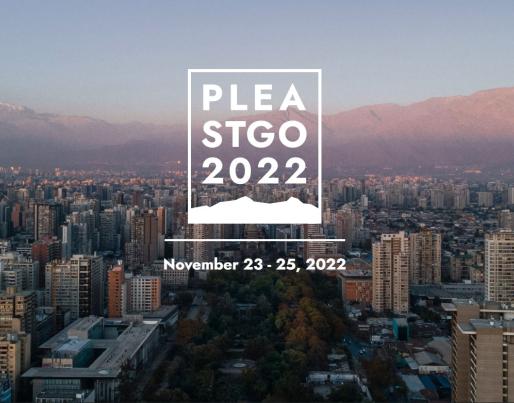PLEA 2022: Will cities survive?

PLEA 2022: Will cities survive?
The aim of the PLEA 2022 is to question the whole idea of a city, the way we inhabit and use them generating the definitive inflection point that a sustainable city requires.
For decades, the climate crisis has been demanding our action and commitment. Numerous efforts to reach an international consensus via climate summits, such as COP25, and Paris Agreement have not had any expected results yet. However, even though the COVID-19 pandemic has intensified the sense of urgency, many talks about climate change were put on hold during 2020, when the new virus put the world on alert.
In no time it has become a global issue and provoked various reactions from political leaders around the world—from absolute denial to the harshest restrictions—adjusting and learning in the process by trial and error.
This process has not been easy as COVID-19 highlighted critical deficiencies in our built environment and urban design. Even though infections battered affluent areas too, the pandemic hit the hardest when the virus reached sectors with high rates of poverty. Dense neighborhoods and overcrowded buildings could facilitate the rapid spread of infections due to the difficulty of generating social distancing and the application of extensive quarantines.
Yet, various changes have been adopted rapidly. Hygiene protocols, wearing masks, social distancing and other strategies has become part of our ordinary life. On top of that, the use of public spaces, streets, parks, homes and all buildings had to be adjusted to control the spread of the virus transforming our habits and conception of them. Numerous studies showed great variations in the use of transportation during the pandemic too. But the questions are: are those changes here to stay? What does the future hold for our built environments?
Some even go as far as to question: Will cities survive? While many intellectuals and academics call for the end of cities (at least as we know them), some stakeholders urge to return to normality, or so-called status quo.
Is this the last opportunity to effectively build a healthy, livable and equitable city? It is clear that cities can no longer be conceived as before and it is time to question the way we inhabit and use them. What are the standards, mechanisms and criteria to define a sustainable city and building? Do they respond to the problems and deficiencies in the age of emergency? History shows us how cities reacted to and changed after health crises similar to COVID-19; this is the time to question everything around us and strive for environmentally sustainable and socially just cities.
The aim of PLEA 2022 is to be a relevant part of the discussion and bring about proposals to the developing and developed world. It is a great chance to talk about the changes that affected cities around the globe since the start of the pandemic and bring the scientific knowledge generated in this short time to the discussion.
After almost a decade the PLEA conference is coming back to South America, Santiago (Chile), to be organized by the Pontifical Catholic University of Chile (PUC). Inevitably, the theme of PLEA 2022 is inspired by the current pandemic which has put the whole world on alert and makes us rethink our built environment in terms of health and safety. Whereas due to its current social unrest and significant social divide Santiago and South America in general provides a great ground to talk about inequalities and revisit social movements, that spanned around the globe from Lebanon, France to Chile and other countries just before the pandemic hit.
Conference Tracks
1. Sustainable Urban Development
- Regenerative Design for Healthy and Resilient Cities
- Sustainable Communities, Culture and Society
- Low Carbon Neutral Neighbourhoods, Districts and Cities
- Urban Climate and Outdoor Comfort
- Green Infrastructure
- Urban Design and Adaptation to Climate Change
2. Sustainable Architectural Design
- Resources and Passive Strategies
- Regenerative Design
- Energy Efficient Buildings
- Net-zero Energy and Carbon-neutrality in New and Existing Buildings
- Vernacular and Heritage Retrofit
- Building Design and Adaptation to Climate Change
3. Architecture for Health and Well-being
- Comfort, IAQ & Delight
- Thermal Comfort in Extreme Climates
- IAQ and Health in Times of Covid-19
- Comfort in Public Spaces
4. Sustainable Buildings and Technology
- Renewable Energy Technologies
- Energy Efficient Heating and Cooling Systems
- Low Embodied Carbon Materials
- Circular Economy
- Nature-based Material Solutions
- Water Resource Management and Efficiency
5. Analysis and Methods
- Simulation and Design Tools
- Building Performance Evaluation
- Surveying and Monitoring Methods
- User-building Interaction and Post-occupancy Evaluation
6. Education and Training
- Architectural Training for Sustainability & Research
- Professional Development
- Sustainable Initiatives and Environmental Activism
- Methods and Educational Practices
- Strategies and Tools
7. Challenges for Developing countries
- Energy poverty
- The Informal City
- Climate Change Adaptation
- Affordable Construction and Architecture Strategies
- Urban Planning and Urban Design Policies for Sustainable Development
- Housing and urban Vulnerability
Find all about the conference HERE.